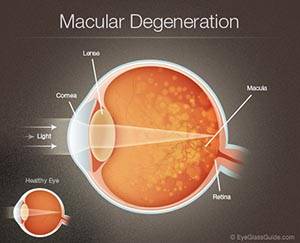 Macular degeneration (also called AMD, ARMD, or age-related macular degeneration) is an age-related condition in which the most sensitive part of the retina, called the macula, starts to break down and lose its ability to create clear visual images. The macula is responsible for central vision – the part of our sight we use to read, drive and recognize faces. So although a person's peripheral vision is left unaffected by AMD, the most important aspect of vision is lost.
Macular degeneration (also called AMD, ARMD, or age-related macular degeneration) is an age-related condition in which the most sensitive part of the retina, called the macula, starts to break down and lose its ability to create clear visual images. The macula is responsible for central vision – the part of our sight we use to read, drive and recognize faces. So although a person's peripheral vision is left unaffected by AMD, the most important aspect of vision is lost.
Macular degeneration presents itself in two forms: dry macular degeneration and wet macular degeneration. Of the two, the “dry” form is far more common.
Macular Degeneration Statistics
Currently, macular degeneration is the leading cause of vision loss in people over age 60. Caucasians are far more likely to lose vision from ARMD than African Americans, and studies show that smoking, high blood pressure, and exposure to UV rays may also be risk factors for developing the disease.
Macular degeneration tends to affect women more than men, and has also been linked to heredity.
Dry Macular Degeneration
The dry form of AMD is more common – about 85% to 90% of all cases of macular degeneration are the dry variety. Vision loss from this form of the disease is usually not as severe as that caused by wet AMD.
Dry macular degeneration is diagnosed when yellowish spots called drusen begin to accumulate in the macula. Drusen are believed to be deposits or debris from deteriorating macular tissue. Gradual central vision loss may occur with dry AMD.
Wet Macular Degeneration
Wet AMD is the more advanced and damaging stage of the disease. In about 10% of cases, dry AMD progresses to wet macular degeneration.
With wet AMD, new blood vessels grow beneath the retina and leak blood and fluid. This leakage causes permanent damage to light-sensitive cells in the retina, causing blind spots or a total loss of central vision.
The abnormal blood vessel growth in wet AMD is the body's misguided attempt to create a new network of blood vessels to supply more nutrients and oxygen to the macula. But the process instead creates scarring and central vision loss.
Macular degeneration signs and symptoms
Macular degeneration usually produces a slow, painless loss of vision. Early signs of vision loss associated with macular degeneration can include seeing shadowy areas in your central vision or experiencing unusually fuzzy or distorted vision. In rare cases, it may cause a sudden loss of central vision.
Causes of Macular Degeneration
Many forms of macular degeneration appear be linked to aging and related deterioration of eye tissue crucial for good vision. Research also suggests a gene deficiency may be associated with almost half of all potentially blinding cases of macular degeneration.
Treatment of Macular Degeneration
There are no FDA-approved treatments for dry macular degeneration, although nutritional intervention may be valuable in preventing its progression to the more advanced, wet form. A major study conducted by the National Eye Institute looked into the risk factors for developing macular degeneration. The study, called the Age-Related Eye Disease Study (AREDS), showed that high levels of antioxidants and zinc significantly reduce the risk of advanced dry AMD and its associated vision loss. The AREDS study also indicated that taking high dose formulas containing beta carotene, vitamins C and E and zinc can reduce the risk of early stage AMD progression by 25%. Since then, the AREDS 2 study was conducted with the conclusion that beta carotene may not be as important in maintaining macular health, whereas adding lutein and zeaxanthin was found to be more beneficial.
For wet macular degeneration, there are several FDA-approved drugs aimed at stopping abnormal blood vessel growth and vision loss from the disease. These drugs are injected by a retinal specialist. In some cases, laser treatment of the retina may be recommended.
Management of Macular Degeneration
Although much progress has been made recently in macular degeneration treatment research, complete recovery of vision related vision loss is probably is unlikely. Your eye doctor may ask you to check your vision regularly with an Amsler grid – a small chart of thin black lines arranged in a grid pattern. Macular degeneration causes the line on the grid to appear wavy, distorted or broken. Viewing the Amsler grid separately with each eye helps you monitor your vision loss.

